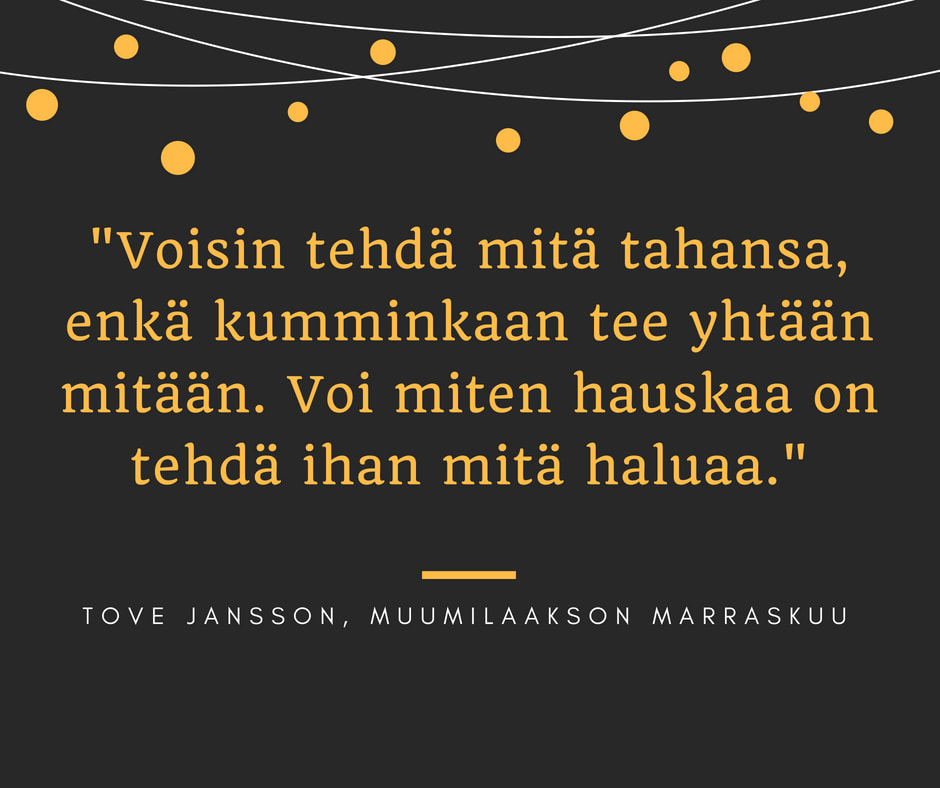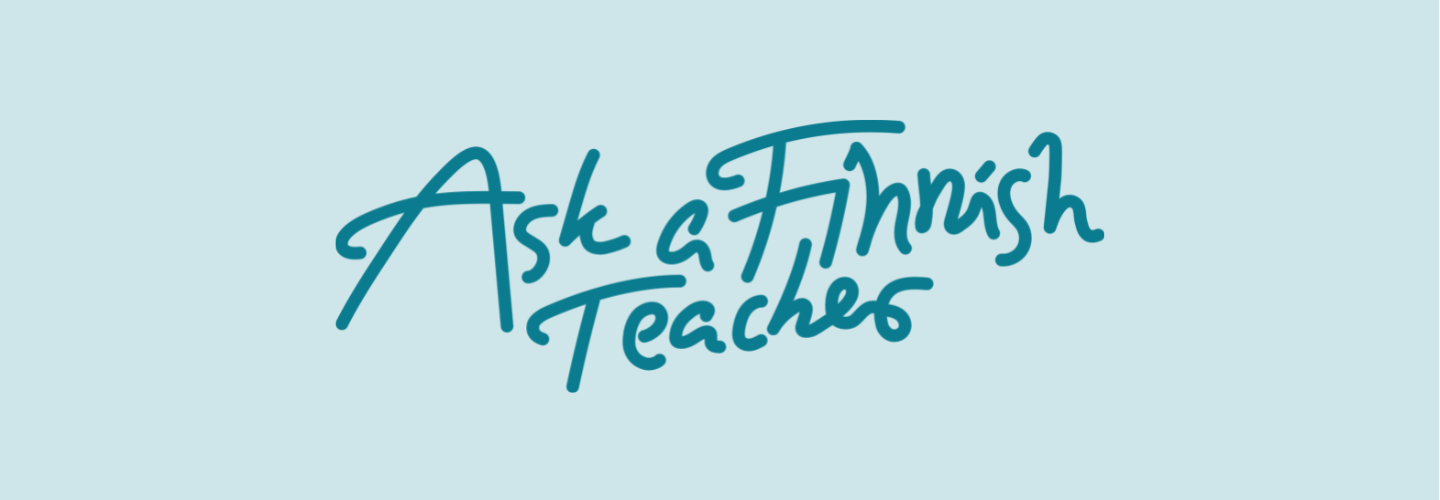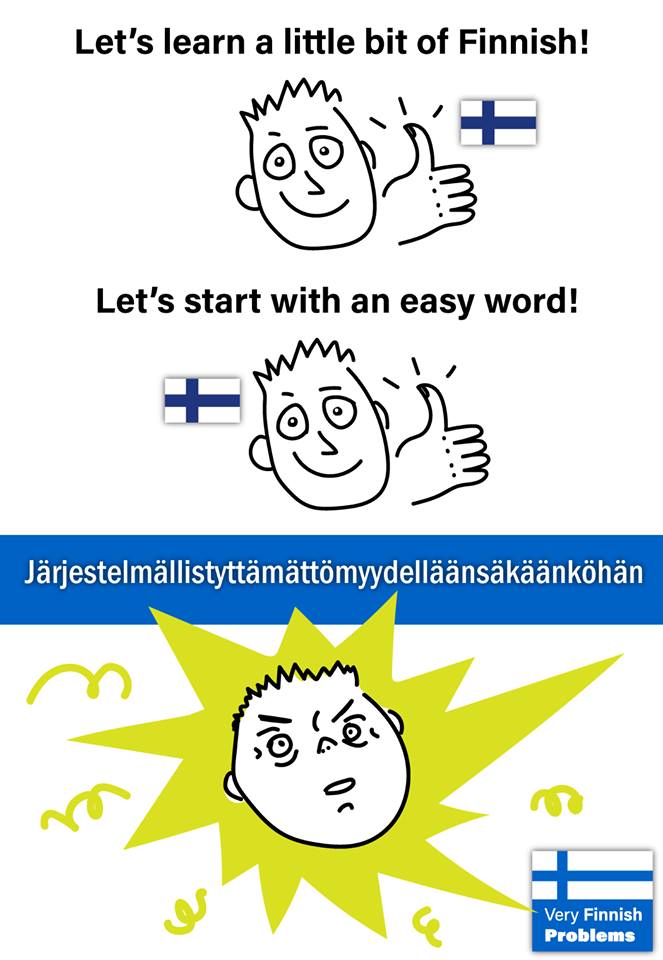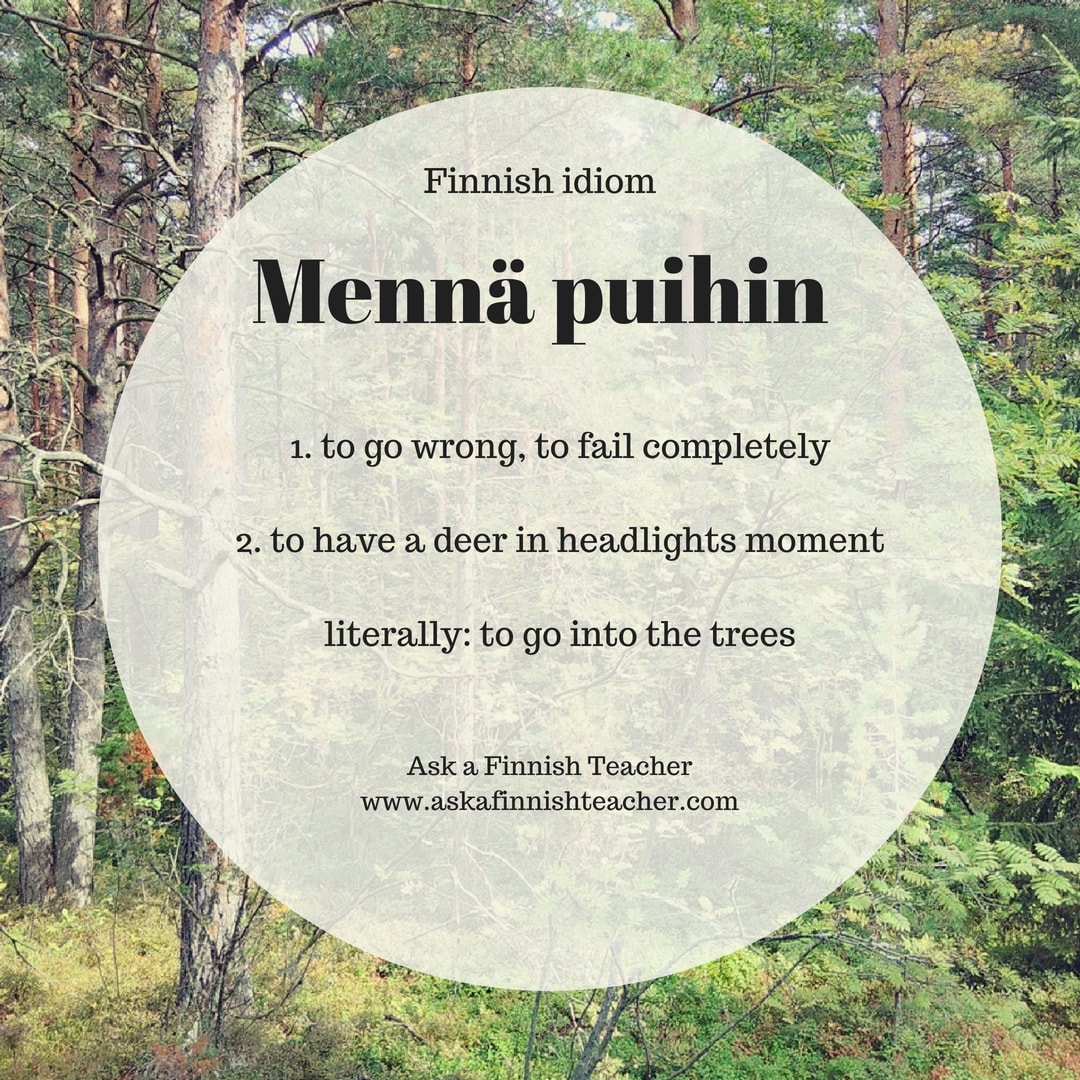|
Last night I came accross this meme from Very Finnish Problems: This meme hit such a nerve that the next day, I can't help but blog about it. I can't remember how many times I've been asked by eager students to explain the meaning of järjestelmällistyttämättömyydelläänsäkäänköhän and the even longer negative version epäjärjestelmällistyttämättömyydelläänsäkäänköhän. These words make me let out a heavy sigh every time. It's impossible.
Here's the thing: in Finnish, it's possible to construct endlessly long words. These aren't even words, really, but theoretically correct forms that don't actually mean much. In English grammar, a similar classic that you may or may not have heard of is Colorless green ideas sleep furiously, a grammatically correct sentence that doesn't really mean much when you look at it more closely. Epäjärjestelmällistyttämättömyydelläänsäkäänköhän is similar, it's composed of parts that all mean something, but the meaning of the entire thing is really slippery and nonsensical. Like a poem or abstract painting. So, what are the parts that make up this modernist poem of a word? First, we have to verb järjestää, 'to organize'. From that, we get the noun järjestelmä, which means 'system' or literally something that is organized. Then, we make it a verb again. We get järjestelmällistyttää 'to make into a system'. And then we make it a noun again! Because why not! Järjestelmällistyttämättömyys is 'the act of not making something into a system'. See how we're wading into Jabberwocky territory? I'll stop here, but feel free to keep going in the comments! But yeah, the meme does have real point. Finnish words are often really long, which can be super confusing and annoying when you're starting out. We like to stick stuff together to make new meanings, and then we stick stuff at the beginning and end to convey things like tone, negation or asking. What are your favorite or most hated long Finnish words? I'm happy and honored to be a guest blogger on the awesome Random Finnish Lesson today!
The post is about practicing pronunciation and our book Fonetiikka suomen kielen oppijoille. The post is in simple Finnish, so if you already know some Finnish, you'll be able to understand at least some of it. I teach Finnish in Helsinki and online, mainly private lessons but also at Helsingin työväenopisto, which is a non profit adult education institute funded mainly by anyone who pays their taxes to Finland. Organizing a course in Helsinki costs a few thousand euros depending on things like the length of the course, how many people are attending, the venue, the study materials, the teacher's salary and how much VAT you need to pay, so for profit private courses can get pretty expensive for the student. However, at Helsingin työväenopisto you can do a semester long course, twice a week, for 47 euros, and a four week course for as little as 8 euros. We have a variety of Finnish courses for different levels as well as many other languages, philosophy, cooking, yoga, music and art history, just to name a few. So if you're in Helsinki, be sure to sign up! I have four courses coming up this autumn: Suomi 2: Finnish for those who already know the very basics This group started from 0 with me in September 2017. We've covered all of Suomen mestari 1 so far and will be doing chapters 1 to 4 from Suomen mestari 2 this autumn. The group has evolved along the way, with lots of new faces in January, so don't worry if you weren't there last year! There will be lots of communicative exercises as well as music and movement to help you learn, and as with me always, a focus on speaking and spoken language, pronunciation, intonation and rhythm. But of course we'll also be digging into writing, reading comprehension and grammar. Place: Opistotalo, Helsinginkatu 26, room 405 Time: Tuesdays from 16.45 to 19.15 and Thursdays from 16.45 to 18.15 Suomi 4: Intermediate Finnish This is a brand new group for me, and our starting level will be B1.2. At B1.2, you're able to communicate quite fluently in basic situations, like buying a coffee, having a simple one on one conversation in Finnish or writing a simple e-mail in Finnish. Following a rapid conversation between native speakers may still be really confusing, but you should be able to catch words and phrases here and there and make educated guesses about what's going on. Same goes for reading a newspaper - you might not understand everything yet, but your guesses about what the article is about are usually right. The news in simple Finnish, Selkouutiset, is quite easy to understand at this point. You're also able to do some more complex stuff, like expressing your opinion in Finnish in both written and spoken contexts. You might still make lots of mistakes and have complete blackouts every now and then, but you can usually make yourself understood. In this course, we'll be covering chapters 1-4 from Suomen mestari 4. We'll be looking at the more advanced grammar structures found in written Finnish as well as diving more deeply into spoken Finnish. As we'll only be meeting once a week and covering quite a lot, make sure you have time to study at home, to do a lot of homework and to practice your Finnish regularly. Place: Opistotalo, Helsinginkatu 26, room 405 Time: Thursdays 18.30-21.00 Suomen kielen ääntämiskurssi: Finnish pronunciation These are two mini courses that I'm especially happy about, which will be pretty much identical in content. But you're very welcome to attend both if you really want to practice your pronunciation and don't mind repeating some of the same exercises! In four two hour sessions, we'll be covering the basics of Finnish pronunciation: intonation (also known as the melody of speech), rhythm, vowels, consonants and combinations of sounds, especially diphthongs (ie, ei, äi, iä, ou, uo, öy, yö...). There will be lots of exercises to to both in class and at home. We'll also be doing a lot of listening to help you with your listening comprehension. No prior knowledge of Finnish needed, but I'm hoping to make this a very useful course for anyone struggling with pronunciation or listening comprehesion, regardless of level. We'll also be using music and movement to help you learn as efficiently as possible. Place: Opistotalo, Helsinginkatu 26, room 405 (we'll also be using the language studio, room 316) Time: The first course will be on Tuesdays from 15.00 to 16.30 starting on the 11th of September. The second course will be on Tuesdays from 13.00 to 14.30 starting on the 30th of October Enrollment begins on the 17th of August at 11 am, and you can find more info about all my courses at Työväenopisto here at ilmonet. Hope to see you in my classes in September! Picture by arunas68
Mai writes: I want to know how to say and use "anything", "anywhere", "something", "somewhere" and the like. For example, "Ask me anything", "you can sit anywhere". Kiitos! Moi Mai! What an interesting question! I've been sitting on this for a while, as this is quite a big question that is a bit tricky to answer in a comprehensive way. Here's my best shot at it! If we look at the English words in your question, we can see that there are two groups there: words that start with any: anything, anywhere and words that start with some: something, somewhere. For the any-words, the Finnish equivalent is mikä vain (more formal, written language) and mikä vaan (more informal, spoken language). You have at least two options that also mean the same thing: mikä tahansa and mikä hyvänsä. As we're dealing with Finnish, we of course need to transform the word according to which form we need for a given sentence. In other words, mikä vain comes in a variety of cases to express different meanings. As for the choice between vain or vaan, hyvänsä and tahansa, they all mean the same thing coupled with mikä. So here we go! mikä vain/vaan nominative (also known as the basic form or perusmuoto) Mikä vain on mahdollista! Anything is possible. mitä vain/vaan partitive (also known as the Finnish learner's nightmare) Kysy mitä vaan! Ask me anything! minkä vain/vaan genitive - Minkä jätskin sä haluut? - Ihan minkä vaan! - Which ice cream do you want? - Any one of them! missä vain/vaan inessive - Missä sä haluut istuu? - Missä vaan! - Where do you wanna sit? - Anywhere! The same goes for all the rest of the local cases, so we get mistä vain/vaan mihin vain/vaan millä vain/ vaan mille vain/vaan miltä vain/vaan and finally minä vain/vaan essive miksi vain/vaan translative When we're referring to a person, we'll usually use kuka: kuka vain/vaan nominative 'whoever' ketä vain/vaan partitive 'whoever' kenen vain/vaan genitive 'whose ever' kenet vain/vaan accusative 'whom ever' kenessä vain/vaan inessive in who(m?) ever and so on. Then we come to the second group, the words with some: something, somewhere and so on. something jokin, in spoken language usually joku (which also means someone, to make matters more confusing) Jokin muuttui suomalaisessa politiikassa. Something changed in Finnish politics. Jokin also changes according to which case you want or need to use, giving you a whole bunch of new meanings. For example: Missä: jossakin (in) somewhere Mistä: jostakin from somewhere Mihin: johonkin to somewhere and so forth. To make sure that things don't get too simple, we also have some shorter versions to express the same meanings, for example: Missä: jossain (in) somewhere Mistä: jostain from somewhere As you can see, there are quite a lot of options for expressing these kinds of meanings in Finnish, and I feel like I could just go on making lists about more and more subtle variation for the advanced learner who really wants to cover the whole topic. But I'll stop here this time, let me know in the comments if I've missed something that you'd like to hear more about! EDIT 8.8.2018 at 19.07 Finnish time: My colleague Kati kindly pointed out a pretty crucial mistake in my text. I had written that the essive of mikä vaan is mikä vaan, but it's of course minä vaan. I've made the correction in the text also!  I had a lovely, hot and sunny month of July and am back! This is Part 2 of my answer to Boglárka. Part one lives here.
Boglárka writes: I haven't really found a good translation for mennä puihin, could you help me out with that? The literal translation for mennä puihin would be "to go into the trees", and it means more or less to fail completely or to go very wrong: Projekti meni puihin. 'The project failed.' A quick googling revealed an interesting second meaning that I don't personally remember ever hearing before, but that my spouse Janne says is the primary meaning for him: Menin ihan puihin hänet nähdessäni 'I froze completely when I saw him' In this context, mennä puihin means being unable to speak or do anything in an important situation, like meeting someone you admire for the first time. Basically a deer in headlights moment. So my suggestions for translating mennä puihin would be to fail, to go wrong or to have a deer in headlights moment, depending on context. Mennä puihin seems to me to be closely related to another tree themed expression of failing, mennä metsään "to go into the forest": Mun arvaus meni ihan metsään. Literally: My guess went completely into the forest. 'My guess was totally wrong.' |
Archives
June 2024
|
Ask a Finnish Teacher / Toiminimi Mari NikonenBUSINESS ID (Y-Tunnus) 2930787-4 VAT NUMBER FI29307874 Kaupintie 11 B 00440 Helsinki If you'd like to send me something in the mail, please email me for my postal address. [email protected] +358 40 554 29 55 Tietosuojaseloste - Privacy policy |
© COPYRIGHT 2015-2022 Mari nikonen. ALL RIGHTS RESERVED.





 RSS Feed
RSS Feed